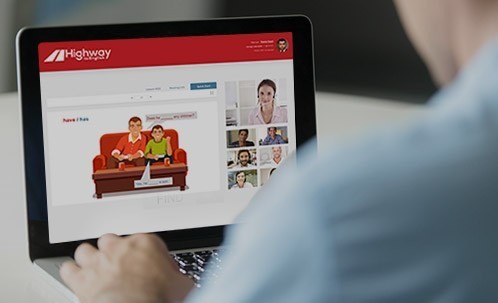 English can be a very difficult language for many to grasp. You have so many idioms, contractions, and even the fact that some words are spelled the same, but pronounced completely different. It can be easy to lose track of grammar rules and sentence structure. You may even be asking yourself: “Can I really learn how to improve my English vocabulary?” There are some options, paired with amazing convenience to your schedule and your wallet.
English can be a very difficult language for many to grasp. You have so many idioms, contractions, and even the fact that some words are spelled the same, but pronounced completely different. It can be easy to lose track of grammar rules and sentence structure. You may even be asking yourself: “Can I really learn how to improve my English vocabulary?” There are some options, paired with amazing convenience to your schedule and your wallet.
Below, you’ll find a place that suits your learning needs, and kicks out any anxiety you have about regressing, or just not being able to learn at all. This will be written to show you what you could expect from each course as a non-native speaker.
The School in Question
Highway to English is the place to start if you’re looking to refine your English skills. There are many options out there, but to be frank, the curriculum and teachers experience is severely lacking. Not here. At Highway to English, you’ll only be taught by certified teachers with decades of experience, and you’ll be comforted to know that the courses are consistently praised amongst the students.

But how does it work? You’ll be connected to your teachers on a weekly basis via video lecture. But you’re not alone. You have classmates from all regions of the world sitting along-side you, participating, and discussing the materials. Don’t be afraid to ask them for help, or to discuss the weekly topics; it’s what they’re there for. Articles and blogs from teachers are also routinely updated.
Outside resources are prevalent with the website. You have everything from online speaking, translation, writing, and multiple-choice questions. Don’t worry about getting any practice answers wrong, they won’t affect your overall grade, and on-the-spot corrections are made to help you improve.
The teachers are one of the most important parts of this method. Each one is devoted to helping you improve your English vocabulary. Whether it be a brush-up, or learning the language from scratch. You can take classes from Dolores Wendell, who speaks 4 languages fluently. Elena Perez, with the 25 years of experience to help you learn the best you can, or Terry Montangue, who has spent over 10 years teaching English for government agencies and universities. These are just three exceptional examples of the teachers you can choose from.
Now that you’re familiar with the school and faculty, you can read on to see what to expect from what courses they have to offer.
English Level A
Here is the beginners level. This is for someone completely new to the English language, or someone who has a bit of knowledge and would like to expand what they already know.
This is where you’ll start. Here, you’ll learn how to explain your personal background in English. You’ll have simple, straight-forward conversations that may involve daily tasks. Feeling disconnected? Pop into a chatroom to talk with your peers and learn about them.
The level covers conversations that are designed for low-level speakers. How do you make acquaintances? How do you speak to someone for the very first time? The questions are the center for this course, and it’ll give you the confidence to try it out when you leave your home. Basic verbs and adjectives are taught for proper sentence structure.
Your commitment to the course will be once a week for eight months, and you can even get a complimentary hour of practice once a week too! Can you see yourself seriously improving over that time? You will if you stick with it. By the end of this course, you’ll have learned how to explain things such as personal information, shopping, working, and renting an apartment, as well as describing your living conditions and better expressing things about yourself.
Text will be available for you to get information from pieces of advertising, and menus. Expect more daily examples of text as you move forward in the levels, and take note of any problems you may be facing now.
English Level B
The level requirements should be clear by now, as should the methods you use to tackle the problems that come up. If you’re a little rusty from the last level, no worries, this course will review the previous materials as a guide to give you a better foundation for your fluency.
Conversations start to expand here, and every topic you learn about here will help you drum up more small talk on the streets. Sports, famous people, and food get reviewed on this level. You’ll gain a better understanding of the English culture, whether it’s Philadelphia or Wales; you’ll learn about key events that made the English language what it is.
Prepare to practice interviews, and engage in some light role-play to help expand your English competency. Past, present, and future tenses are introduced and applied thoroughly here, giving you a stronger grasp on how to appropriately construct your sentences. With the same length as your first level, you can be sure the pace will be appropriate, and you can only get better from here.
By the end of this, you should be able to read and discuss letters that you have been sent in class, or find real-world examples of in day to day life. It doesn’t just stop at letters. Advertisements, invitations, and historical figures and cities are all the things you will be able to talk about when prompted to. Your hobbies and habits can also be expressed easily, and your reading skills will take a sharp increase.
 English Level C
English Level C
You’re certainly getting up there. Fluency in some aspects should really start to show, and the motivation to continue learning will only serve you well past this point. Don’t give up, remember how far you’ve come from Level A!
Like the previous level, you’ll just have more to talk about. Instead of history and popular food, this course is packed with information regarding social issues, technology, emotional health, to Genders and more. The topics are starting to broaden, but so are your skills!
Specifically, your reading skills, helping you develop your own opinions, and distinguish those from facts. Arguing your point (politely) is supported here. Prefixes, suffixes, emotional words, travel, gender, social customs, and even jokes are brought up here.
The complexity of the topics pairs well with how complex the sentences you learn will be. Using conjunctions, verb pretenses, more adjectives, and modals to act as your foundation. “Families” of words are going to be stressed for the next few months, acting as a tool to help you distinguish countable and uncountable nouns.
You can watch TV programs such as the news, TV shows, and movies and not lose the sense of what is happening. This helps give your conversational skills a sense of spontaneity.
English Level D
 Officially reaching the Pro level, expect things to really pick up from here. After all, you’re rounding the end of your teaching unless you want to use the Highway specialized courses that take your education to different pathways. Take time to review the materials from any previous level; they’re only going to be built upon.
Officially reaching the Pro level, expect things to really pick up from here. After all, you’re rounding the end of your teaching unless you want to use the Highway specialized courses that take your education to different pathways. Take time to review the materials from any previous level; they’re only going to be built upon.
Workplace conversations are what you’ll be studying around, and structured conversations come in to show you how to appropriately respond. But not just the workplace, your conversational skills will reach a variety of subjects to help you show off your English fluency.
You’ll cover more grammar rules, such as, conditionals that may be real or unreal, complex perfect verb tenses, and another review on how to properly use your conjunctions. Remember those mock interviews? They come back up to give you a better understanding of workplace etiquette and conversation.
Classic literature comes into play here. So expect to take a trip to the past to figures like Shakespeare, who is responsible for many English words. That’s not all; reading about current social issues will be a requirement. Environmental issues will be discussed to talk, as will Nobel Peace Prize Winners.
This will help you form statements from indirect clues, deciphering clues, and organizing things in chronological order. You’ll be able to summarize any text they give you by the end of this: whether its an article or a historical document, you will have it covered.
English for Business Course
Were you a fan of the business sections of your previous courses? Trying to learn English to help impress your international clients? Then this is the course for you.
Everything you learn here will be business-centered, everything. You won’t focus on history, events, or famous people anymore. Instead, you’ll learn how to use English to further your business. You’ll cover situations from the workplace, from more interviews to reading company mission statements. This strengthens those reading and writing skills that are imperative to learn when dealing with international clients.
You’ll also be evaluating developing projects, understanding cross-cultural environments, and even analyzing RVPs. This gets better understood after an extensive training on quantifiers, superlatives and comparatives, and idioms, such as “Like shooting fish in a barrel”.
Your vocabulary will now include topics revolving around contracts, proposals, and rival business competitors, which will help you identify words in their context. This course is 12 weeks long, and you will be spending 36 hours of class-times to help you gain more confidence.
Be comforted in the fact that when you finish this course, your vocabulary skills are going to be top-notch, and so will your business communication skills. Now, you’ll be able to compete for English jobs because of this, and show off just how informed you are on various business topics.
Meetings, conferences (in-person or on the phone), proposals, and contractual agreements won’t be anything you can’t handle. You may even take the opportunity to have small talk with your new business partners, or even invite them to talk over lunch.
With this course and the right amount of determination, you’ll find yourself to be a stand-out in the workplace. Your skills will certainly be impressive, especially if your business partners have never heard you speak English before.
 Highway to Career
Highway to Career
Jobs are hard to find these days, a suitable career? Even harder. It’s been a plague for a very wrong time, and no matter your views on the economy, or politics, it can be rough to find something worthwhile. Trying to find one without efficient English skills? Almost impossible.
That’s why this course is so special. It understands that, and offers to teach those that are looking to find a more comfortable career, or just help those in need further the one they already have. Like the previously mentioned course, you can view this one as being specialized. Meaning that it’s not just trying to teach you English, it’s trying to teach you how to increase your employability.
This level is 12 weeks long, and the outline includes everything from setting a good first impression, to getting off on the right foot and starting your job. For each week there is a module that covers what sets apart a good resume from a “killer” one, negotiating your salary, many interview practices, self-management, to managing your LinkedIn profile and more.
Their goal is simple: To help people make informed decisions about their career. For those that are just getting used to life in America, this is one of the best places to start. The course work was formed by dedicated teachers who want you to succeed.
Using What You’ve Learned Is the Answer to Your Question “How to Improve My English Vocabulary?”
English is a pretty challenging language to master. It may not be as hard to learn as Mandarin, which has thousands of characters that takes years to master, or Japanese, which culture has different rules for its written and spoken languages. But to learn a language fluently deserves it’s share of effort.
Here, you have a school system that’s been routinely appreciated by its students and teachers. Both of which are there to make every step towards learning English a comfortable step, and one forward. You won’t have to worry about not making it to class, or not being able to afford your classes. The school makes it a viable option, and one that will leave you wanting to learn more.
So embrace your new-found culture. After all you’ve learned, you have so many people (around 350 Million in the US) to connect with. You can enjoy media programs like movies and tv, and show more appreciation for it because now you can actually understand it.
Songs won’t sound the same. The melody will be just as catchy as the lyrics that you may find yourself humming or singing now in the language. It’s an exciting skill, and not one that you should keep to yourself.
Go out and put those English skills to the test!
.